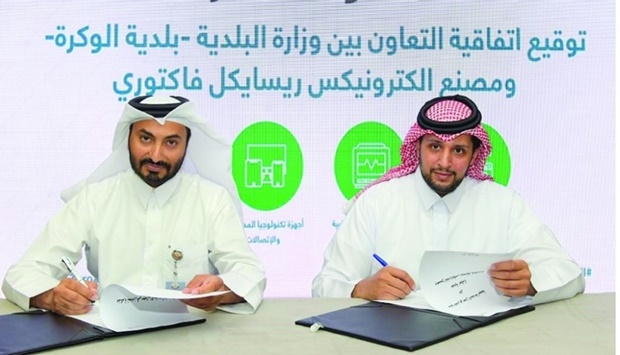The Al Wakrah Municipality on Sunday signed a co-operation agreement with Electronic Recycling Factory (ERF) to safely dispose and recycle household appliances, medical, ICT (information and communications technology) and electrical equipment utilised in industry and construction.
The agreement was jointly signed by Al Wakrah Municipality director Mohamed Hassan al-Nuaimi and ERF chief Sheikh Hamad bin Abdulaziz bin Nasser al-Thani.
Al-Nuaimi underscored the importance of the agreement which represents a crucial platform to boost co-operation and partnership in the area of sustainable development and environment preservation, as one of the core pillars of Qatar National Vision 2030.
It is also an opportunity to share experiences, ideas and knowledge to attain the best possible practices and effective applicable action plans in the area of recycling electronic wastes that would essentially increase the awareness regarding these wastes, including the threat they pose to health and environmental integrity.
Sustainability co-ordinator at Al Wakrah Municipality, Engineer Suha Mahmoud, said the major challenges facing the world, including climate and shortage of water resources, require all entities to take the lead and explore effective solutions for the inherent environmental problems related to alternative energy.
She emphasised the role undertaken by the municipalities in this aspect, since they are primarily the responsible entities and the most familiar with the details of their communities they encounter and the most capable of finding sustainable solutions to the issues.
Mahmoud added that the agreement is one of the municipality's mechanisms of action in mitigating the carbon emissions and vividly serve the initiative that has been launched by Al Wakrah Municipality under the title “Al Wakrah initiative on the path to carbon neutrality”.
ERF chief executive Hatem Alhamayda spoke about the objectives of the factory in the area of economic and environmental sustainability, pointing out that the factory adopts the high standards of European technology to ensure the secure and proper disposal of these hazardous wastes to be recycled for further utilisation.
The official noted that the factory has a capacity to recycle 45,000 tonnes of wastes annually, and conducts awareness and field extension programmes on the importance of recycling for the sake of conserving the environment in pursuit of environmental sustainability through reaching out to all institutions and communities.
The agreement was jointly signed by Al Wakrah Municipality director Mohamed Hassan al-Nuaimi and ERF chief Sheikh Hamad bin Abdulaziz bin Nasser al-Thani.
Al-Nuaimi underscored the importance of the agreement which represents a crucial platform to boost co-operation and partnership in the area of sustainable development and environment preservation, as one of the core pillars of Qatar National Vision 2030.
It is also an opportunity to share experiences, ideas and knowledge to attain the best possible practices and effective applicable action plans in the area of recycling electronic wastes that would essentially increase the awareness regarding these wastes, including the threat they pose to health and environmental integrity.
Sustainability co-ordinator at Al Wakrah Municipality, Engineer Suha Mahmoud, said the major challenges facing the world, including climate and shortage of water resources, require all entities to take the lead and explore effective solutions for the inherent environmental problems related to alternative energy.
She emphasised the role undertaken by the municipalities in this aspect, since they are primarily the responsible entities and the most familiar with the details of their communities they encounter and the most capable of finding sustainable solutions to the issues.
Mahmoud added that the agreement is one of the municipality's mechanisms of action in mitigating the carbon emissions and vividly serve the initiative that has been launched by Al Wakrah Municipality under the title “Al Wakrah initiative on the path to carbon neutrality”.
ERF chief executive Hatem Alhamayda spoke about the objectives of the factory in the area of economic and environmental sustainability, pointing out that the factory adopts the high standards of European technology to ensure the secure and proper disposal of these hazardous wastes to be recycled for further utilisation.
The official noted that the factory has a capacity to recycle 45,000 tonnes of wastes annually, and conducts awareness and field extension programmes on the importance of recycling for the sake of conserving the environment in pursuit of environmental sustainability through reaching out to all institutions and communities.

